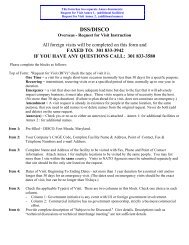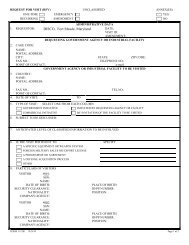DSS ACCESS, Volume 1, Issue 3 - Defense Security Service (DSS)
DSS ACCESS, Volume 1, Issue 3 - Defense Security Service (DSS)
DSS ACCESS, Volume 1, Issue 3 - Defense Security Service (DSS)
Create successful ePaper yourself
Turn your PDF publications into a flip-book with our unique Google optimized e-Paper software.
E2C2 Director Craig Healy echoed that sentiment during a<br />
visit to <strong>DSS</strong> last year to brief <strong>DSS</strong> employees on the results<br />
of a significant investigation, where he praised the work<br />
of <strong>DSS</strong>. He noted that his relationship with <strong>DSS</strong> goes back<br />
to his days as a field agent, where he relied heavily on<br />
the industrial security knowledge and access to industry<br />
provided by <strong>DSS</strong> representatives.<br />
Last year, Immigration and Customs Enforcement (ICE) and<br />
the Department of Commerce opened more than 100 law<br />
enforcement investigations for violations of U.S. export<br />
control laws as a result of <strong>DSS</strong> Counterintelligence (CI)<br />
referrals. For Fiscal Year 2012, the federal law enforcement<br />
and intelligence communities are on track to open more than<br />
500 investigations or operations based on <strong>DSS</strong> CI referrals.<br />
These referrals run the gamut of criminal violations or illegal<br />
intelligence activity related to espionage, fraud, export<br />
control violations, and illegal disclosures of U.S. classified<br />
information, taking place within or directed against the<br />
cleared industrial base.<br />
“While we lack federal law enforcement<br />
authority, our small agency serves as<br />
a force multiplier for the much larger<br />
agencies that do,” said Sims. “Our<br />
relationship with cleared industry<br />
provides significant operational<br />
and investigative advantages to<br />
law enforcement and<br />
the other federal<br />
communities<br />
we support.”<br />
EXECUTIVE ORDER 13558<br />
assigns the following functions to the<br />
Export Enforcement Coordination Center:<br />
Serve as the primary forum within the federal<br />
government for executive departments and<br />
agencies to coordinate and enhance their<br />
export control enforcement efforts. The<br />
center will also identify and resolve conflicts<br />
that have not been otherwise resolved in<br />
criminal and administrative investigations<br />
and actions involving violations of U.S.<br />
export control.<br />
Serve as a conduit between federal<br />
law enforcement agencies and the U.S.<br />
intelligence community for the exchange of<br />
information related to potential U.S. export<br />
control violations.<br />
Serve as the primary point of contact<br />
between enforcement authorities and<br />
agencies engaged in export licensing.<br />
Coordinate law enforcement public outreach<br />
activities related to U.S. export controls.<br />
Establish government-wide statistical<br />
tracking capabilities for U.S. criminal and<br />
administrative export control enforcement<br />
activities. This will be conducted by the<br />
Department of Homeland <strong>Security</strong> with<br />
information provided by and shared with<br />
all relevant departments and agencies<br />
participating in the Export Enforcement<br />
Coordination Center.<br />
CENTER TOUR: <strong>DSS</strong> Director Stan Sims (left) received<br />
a tour of the Export Enforcement Coordination<br />
Center from James Dinkins, executive associate<br />
director of Homeland <strong>Security</strong> Investigations for U.S.<br />
Immigration and Customs Enforcement.<br />
http://www.dss.mil —— 25




